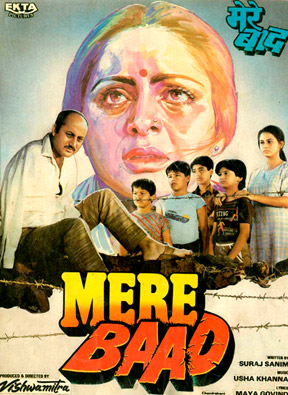
The decade of 80s is often ridiculed for its directionless mainstream films mostly focusing on action and all cliched, forced drama. Numerous Hindi movies made by the South filmmakers in a repetitive format were also the key projects seen in this particular time period. However, many worth watching gems in the off-beat genre were also the part of the same 80s, still remembered for their vision as well as content made by the renowned film-makers.
To be fair, though MERE BAAD directed by Vishwamitra is not any outstanding film in its execution beginning on a confused note with a lady giving birth to her sixth child in the hospital and the loving husband not even coming to take them home with care. But the highly emotional subject takes care of this shortcoming as soon as the basic plot is revealed post around 35 minutes of the narration establishing the instant connect.
Crediting its writing to Suraj-Sanim, the film is about a middle-aged couple facing an unexpected twist in their life, when the husband loses his hands in a brutal accident and the wife gets diagnosed of lung cancer with just a few months’ time left. So, considering the future of their 6 kids, they both take some unbelievably bold steps to ensure a secure life ahead for them all, that becomes the heart-wrenching crux of the film.
Having its own share of the typical melodrama, MERE BAAD actually scores because of its unusual subject matter that forces the viewer to think about the evident uncertainties of life, wherein nobody knows what’s going to happen next, with whom and when. The film also majorly works because of its worth praising lead performance effortlessly enacted by Rakhee as the adorable mother. The kids play their parts well but it surely would have been a much better presentation with a more detailed characterisation of the husband, otherwise decently performed by Anupam Kher.
In the music department a few tracks (composed by Usha Khanna) rendered well have meaningful lyrics (Maya Govind) written as per the plot but the rest could have been avoided, inserted at some awkward moments.
Anyway, for some reasons, MERE BAAD is neither remembered nor quoted among all the thoughtful experimental films of those times, may be due to its rare availability or an above average execution of a bold theme. But if possible, do watch it to experience what kind of subjects used to be adapted for such emotional realistic films in the decades of 70s and 80s showcasing a cinematic understanding and courage too. Watch it if you are interested in stories….., stories about life and its unexplored avenues, when completely unexpected situations become our best teacher and guide, enlightening us with the most valuable lesson of living.
In short, yes it revolves around terminal illness but it's not just another film exploiting the same.
Rating : 3 / 5
The Inspirational Angle
Though the Hindi film’s writing was credited to Suraj-Sanim, MERE BAAD was in reality an unofficial Indianized adaptation of a 1983 American biographical film (made for television) based on the life of Lucile Fray, who was diagnosed with cancer in 1952 and decided to find families who can adopt her 10 children. She took that decision as she felt her husband would not be able to take a good care of them all and then was successful in finding new homes for her kids.
The much appreciated and award-winning film was titled WHO WILL LOVE MY CHILDREN. It was directed by John Erman and had Ann-Margret, Cathryn Damon, Frederic Forrest and more playing the key roles.
Interestingly MERE BAAD was the first film to get inspired from the original English film in 1988 but no one credited the Hindi film later in the other remakes of the same in different Indian languages.
In 1993 a Malayalam film titled AKASHADOOTHU was made based on the same subject. It was directed by Sibi Malayil and featured Madhavi and Murali in the lead roles. The film also won the National Film Award for Best Film on Family Welfare and Madhavi won a few reputed awards for her splendid act.
In the same year AKASHADOOTHU was officially remade in Telugu as MATRU DEVO BHAVA which was later dubbed in Tamil as THAAI ULLAM.
In 1994 it was again officially remade in Kannada as KARULINA KOOGU.
In 2001, it was made as CHIMANI PAKHARE in Marathi with Padmini Kolhapure playing the lead role.
In 2008, another official version was made in Hindi as TULSI featuring Manisha Koirala and Irrfan Khan as the couple.
In the same decade, renowned director K. Balanchander adapted a similar theme for his Serial CHHOTI SI AASHA aired on Sony TV with some significant changes in the storyline.
And then in 2019, a stuck Punjbai film got released made on the same subject titled AASRA.
Mentioning the above remakes, its perhaps the best example of an English film being remade in maximum Indian languages with many winning reputed awards too. At the same time, it’s really interesting and strange to notice that though the 1993 Malayalam film was a big hit winning great appreciation, the original source was more or less ignored and the first attempt in Hindi as MERE BAAD in 1988 was not even remembered by anyone.
Cheers!
Bobby Sing
Bobbytalkscinema.com
(Note : Just as a passing afterthought, if MERE BAAD would have been made in the past two decades of the new millennium, then it surely had a strong possibility of getting LIC or another Life insurance company on board as its key sponsor, because the theme perfectly fits to be a part of their promotional campaign)

